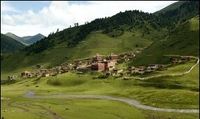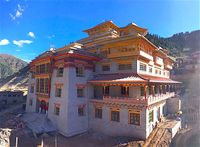Shechen Monastery: Difference between revisions
No edit summary |
No edit summary |
||
| (7 intermediate revisions by 4 users not shown) | |||
| Line 1: | Line 1: | ||
'''Shechen Monastery''' (Tib. zhe chen) | [[Image:Shechen tibet 1.jpg|thumb|200px|Shechen Monastery in Tibet]]'''Shechen Monastery''' (Tib. ཞེ་ཆེན་, [[Wyl.]] ''zhe chen'') — one of the [[Six "Mother" Nyingma Monasteries]] of Tibet, was founded in 1695 by [[Shechen Rabjam Tenpé Gyaltsen]] who was sent to Kham with this purpose by the [[Fifth Dalai Lama]].<ref>Some sources say it was established by [[Gyurme Kunzang Namgyal]], the second Shechen Rabjam Rinpoche, in 1734.</ref> | ||
==Shechen Monastery in Tibet== | |||
[[Image:Shechen Kham Michael W. Schmitz.jpg|thumb|200px|Shechen Monastery, Tibet, courtesy of Michael W. Schmitz]] | |||
Shechen Monastery became, gradually, the head of a network of around one hundred and sixty satellite monasteries situated all over the Himalayan region. Rapidly becoming renowned for the authenticity of the teachings at its [[shedra]] and for the quality of its sacred arts, it became one of the six main monasteries of the [[Nyingma]] tradition. Many great masters came forth from Shechen Monastery including [[Shechen Gyaltsab]], [[Shechen Kongtrul Pema Drimé Lekpé Lodrö|Shechen Kongtrul]], [[Khenpo Gangshar]], and the sage [[Mipham Rinpoche]]. [[Dilgo Khyentse Rinpoche]], [[Chögyam Trungpa]] and many other important 20th century teachers received teachings at the monastery. | |||
==Shechen Monastery in Exile== | ==Shechen Monastery in Exile== | ||
[[Image:Shechen.jpg|thumb| | [[Image:Shechen.jpg|thumb|200px|Shechen Monastery in Baudhanath, Kathmandu]]In 1980, in exile in Nepal, Kyabje [[Dilgo Khyentse Rinpoche]] began the building of Shechen Tennyi Dargyeling Monastery in [[Baudhanath]], Kathmandu. Intent on preserving the extremely rich artistic tradition of the original Shechen Monastery in Tibet, Kyabje Dilgo Khyentse Rinpoche supervised all the aspects of the work with the greatest attention to detail. Magnificent paintings cover the walls of the main temple and one hundred and fifty statues were made for it by the best Tibetan craftsmen and sculptors of the time. | ||
The monastery hosts an important Tibetan library, the Tsering Art School for the preservation of Tibetan culture and sacred arts and a [[shedra]]. More than three hundred monks live at the monastery and receive an education which, apart from philosophical teachings, comprises traditional music, dance and painting. | The monastery hosts an important Tibetan library, the Tsering Art School for the preservation of Tibetan culture and sacred arts and a [[shedra]]. More than three hundred monks live at the monastery and receive an education which, apart from philosophical teachings, comprises traditional music, dance and painting. | ||
The abbot of Shechen Monastery is the seventh [[Shechen Rabjam Rinpoche]]. | The abbot of Shechen Monastery is the seventh [[Shechen Rabjam Rinpoche]]. | ||
==Notes== | |||
<small><references/></small> | |||
==Internal Links== | ==Internal Links== | ||
| Line 13: | Line 20: | ||
==External links== | ==External links== | ||
*[http://www.shechen.org | *[http://www.shechen.org Official website of Shechen Monastery ] <br> | ||
*[http://www.shechen.org/sub_tsering.html Tsering Art School] | *[http://www.shechen.org/sub_tsering.html Tsering Art School] | ||
[[Category:Nyingma Monasteries]] | [[Category:Nyingma Monasteries]] | ||
Latest revision as of 09:33, 8 April 2018

Shechen Monastery (Tib. ཞེ་ཆེན་, Wyl. zhe chen) — one of the Six "Mother" Nyingma Monasteries of Tibet, was founded in 1695 by Shechen Rabjam Tenpé Gyaltsen who was sent to Kham with this purpose by the Fifth Dalai Lama.[1]
Shechen Monastery in Tibet

Shechen Monastery became, gradually, the head of a network of around one hundred and sixty satellite monasteries situated all over the Himalayan region. Rapidly becoming renowned for the authenticity of the teachings at its shedra and for the quality of its sacred arts, it became one of the six main monasteries of the Nyingma tradition. Many great masters came forth from Shechen Monastery including Shechen Gyaltsab, Shechen Kongtrul, Khenpo Gangshar, and the sage Mipham Rinpoche. Dilgo Khyentse Rinpoche, Chögyam Trungpa and many other important 20th century teachers received teachings at the monastery.
Shechen Monastery in Exile

In 1980, in exile in Nepal, Kyabje Dilgo Khyentse Rinpoche began the building of Shechen Tennyi Dargyeling Monastery in Baudhanath, Kathmandu. Intent on preserving the extremely rich artistic tradition of the original Shechen Monastery in Tibet, Kyabje Dilgo Khyentse Rinpoche supervised all the aspects of the work with the greatest attention to detail. Magnificent paintings cover the walls of the main temple and one hundred and fifty statues were made for it by the best Tibetan craftsmen and sculptors of the time.
The monastery hosts an important Tibetan library, the Tsering Art School for the preservation of Tibetan culture and sacred arts and a shedra. More than three hundred monks live at the monastery and receive an education which, apart from philosophical teachings, comprises traditional music, dance and painting.
The abbot of Shechen Monastery is the seventh Shechen Rabjam Rinpoche.
Notes
- ↑ Some sources say it was established by Gyurme Kunzang Namgyal, the second Shechen Rabjam Rinpoche, in 1734.